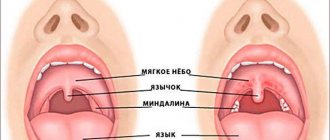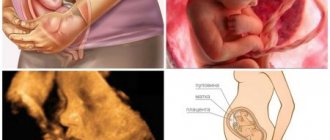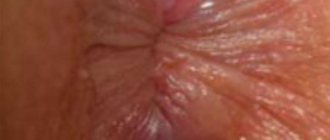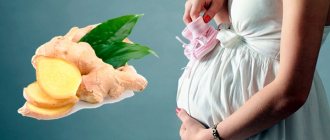Pain is an endogenous human signaling system. It indicates an imbalance in the functioning of the internal environment of the body. If you have a headache every day, then you can talk about the process being chronic. If all people with cephalalgia decided to seek medical help, there would be a collapse in medical institutions. But this does not happen, since there is an opinion that a headache can, and sometimes should, hurt. The situation changes radically under certain conditions. For a woman, this condition is pregnancy. Headache during pregnancy is always a reason to consult a doctor. According to statistics, every fifth pregnant woman experiences episodes of cephalalgia.
Changes in the body during pregnancy
Pregnancy is not a disease, but a special state of a woman’s body. It forces the body to work in a new mode of increased tension. During this period, the organ systems of the expectant mother must ensure their vital functions and the unborn child. Changes occur everywhere, some of which are the cause of headaches during pregnancy.
| Organ or system | The nature of perestroika | Effect on the occurrence of headaches |
| The cardiovascular system. | I trimester. A large amount of progesterone leads to vasodilatation and a decrease in blood pressure. Pregnant women with initially low blood pressure may experience severe hypotension. The second and third trimesters are accompanied by an increase in minute volume of blood circulation and cardiac output. Peripheral vascular resistance causes vascular spasm. These changes entail an increase in blood pressure. | Yes Yes |
| Hormonal changes in the female body. | Prolongation of pregnancy is ensured by a large amount of progesterone. It is synthesized first by the corpus luteum of the ovary in the short term, and then by the placenta. Additionally, it leads to relaxation of any smooth muscles and vasodilation. A few weeks before the onset of labor, the level of prostaglandins locally in the uterus and in the body as a whole increases. Prostaglandins are mediators of inflammation. | Yes Yes |
| The immune system | Immunosuppression ensures the development of the child. If the immune system worked normally, the fetus would be perceived as a foreign agent that needs to be fought. | Not really |
| Digestive system | Hypotonia of smooth muscles leads to stagnation of contents in the hollow organs. The woman begins to be bothered by heartburn, belching, a feeling of fullness in the stomach, constipation, heaviness in the right hypochondrium, and dyspepsia. Food may be difficult to digest. Symptoms of early toxicosis are often associated. The patient suffers painfully from it. | Yes |
| central nervous system | The changes are associated with the formation of a locus of excitation, called the pregnancy dominant. Around the zone of excitation there is a territory of inhibition, which protects it. The dominant of pregnancy explains the behavior of a pregnant woman. She becomes sentimental, tearful, sometimes depressed, worried about the fate of the child, which can cause attacks of pain in the head. | Yes |
How to get rid of pain during pregnancy using folk remedies?
It is more important to use folk remedies for severe headaches that occur during pregnancy. They cause minimal damage to the fetus and help the expectant mother. Ice wiping of the head and orthopedic pillows help. Tea with raspberries and honey has a calming effect.
To relieve spasms, you can take a hot bath, but be careful not to cause vasodilation. Washing your hair with cool water and herbs helps. Aromatherapy is used - pleasant smells have a relaxing effect on the pregnant woman and relieve tension pain. Cephalgia can also be relieved using such folk methods.
- Applying a copper coin.
- Rubbing your temples with cabbage juice and applying a cabbage leaf.
- Tying a wool strip on the head.
- Applying a fresh onion to your temples.
- Mustard powder on the back of the head, calf muscles.
- Lubricating the temples with grated lemon with peel.
Herbal treatment
There are folk recipes that help relieve headaches with herbs. Folk remedies are safe; they have contraindications for individual intolerance. They do not contain synthetic or chemical additives and have been tested for centuries. The best option for a pregnant woman.
- Freshly squeezed viburnum juice mixed with a small amount of honey. Taken up to four times a day.
- Thyme. Infused in boiling water and consumed three times a day.
- Hawthorn. The berries are poured with boiling water and kept over low heat for ten minutes. Drink on an empty stomach.
- Mint. Leave for forty minutes. Taken during attacks.
- Decoction of willow leaves with violet. Used when necessary.
- St. John's wort. Fill with a glass of water and keep on low heat for five minutes.
- Freshly squeezed blackcurrant juice. Drink three times a day.
- Clover infusion. It lasts for an hour. Take three times one hundred grams.
- Nettle. Pour boiling water over it and simmer in a thermos for two hours. Mixed with honey.
Interesting: Why do you get headaches during pregnancy? Causes, treatment and prevention of pain
Treatment with mud and clay
Traditional methods of treating pregnant women using mud and clay have proven highly effective for centuries. The following recipes are used.
- Healing mud is mixed with lemon juice. Infusions of mint and calendula are added. The mixture is laid out on gauze in a layer of 5-7 millimeters. Use as a lotion for thirty-five minutes.
- Mix one hundred grams of clay with warm water, fifty grams. Place a layer of half a centimeter on a thick fabric. Apply as a wrap from one temple to another. The exposure time is twenty minutes.
- Half a glass of clay is diluted with warm water and mint infusion is added. The mixture is applied to the forehead for fifteen minutes.
- The mixture of clay and water is diluted with a few drops of menthol oil. Leave as a compress for no more than five minutes.
- The clay is diluted with warm water until creamy. Apply to the feet, wrap in cellophane, and put warm socks on top. Exposure – one hour.
Causes of headaches in pregnant women
A gynecologist should understand the causes of headaches during pregnancy. The international classification provides for the following options during pregnancy:
- Primary forms:
- Migraine. The most typical primary form. Migraine during pregnancy has classic symptoms. A third of patients may experience a decrease in the intensity of cephalalgia, while others experience migraine for the first time;
- Tension cephalalgia. Due to the tension of the muscles covering the skull, the brain does not receive enough oxygen. Hypoxia leads to an attack of cephalgia;
- Associated with cough, physical activity, sex, cold. Rare forms are usually diagnosed by exclusion.
- Secondary forms:
- Post-traumatic (skull fractures, severe neck injuries);
- Vascular. Headaches often occur after an ischemic or hemorrhagic stroke. Quite rare during pregnancy;
- Hypertensive. Any diseases associated with increased intracranial pressure can lead to spasms in the brain;
- Chemical abuse or withdrawal. The onset of pregnancy forces women to change their habits, lifestyle, and stop using a number of substances. First of all, this is due to limiting or refusing coffee. Not all drugs can be used during pregnancy, which also leads to withdrawal syndrome and cephalalgia;
- Infectious. Fever of any origin, infection are accompanied by intoxication syndrome and headache;
- Pathology of homeostasis. For a pregnant woman, arterial hypertension, kidney pathology with hypertensive syndrome, preeclampsia, eclampsia are of particular importance;
- Mental disorders.
What causes primary headaches:
- Changed hormonal levels;
- Physiological changes in the cardiovascular system;
- Mental/psychological instability, stress;
- Fluctuations in climatic conditions (temperature, atmospheric pressure, humidity);
- Poor nutrition during pregnancy;
- Dehydration;
- Disturbance of biological rhythms.
Causes of secondary headaches:
- Preeclampsia, eclampsia;
- Chronic arterial hypertension;
- Obesity, especially morbid obesity;
- All types of anemia;
- Inflammatory processes of the accessory sinuses.
A pregnant woman can have a headache for various reasons. Only a doctor can take responsibility for establishing the etiology, prescribing therapy, and deciding whether hospitalization is necessary.
Headache during pregnancy: features, causes and treatment
Women carrying a child regularly suffer from migraines. Headaches often appear in the first three months of an “interesting” position, and continue to bother you until the baby is born.
Features of headaches during pregnancy
Migraine attacks are often accompanied by vomiting, stomach upset, vision problems, nausea, dizziness and other negative sensations. For many women, pain symptoms spread throughout the entire upper body. The back of the head often hurts, the frontal parts of the head are “torn” or there is pressure on the temples.
Headache during pregnancy may not be associated with any pathology. In such cases, this is simply the body’s reaction to changes occurring in the woman. Hormonal “explosions”, toxicosis, lack of nutrients and vitamins and many other reasons can provoke pain.
But sometimes migraines are a consequence or symptoms of a specific disease. Let's look at the reasons why these negative feelings appear.
Causes of headaches in pregnant women
Most often, migraines in pregnant women are a neurological pathology. They occur due to problems with the blood vessels of the brain, changes in the internal processes of the body, in particular, problems in the production of such a biologically active component as serotonin.
They are characterized by powerful pulsating pain sensations in certain areas of the head. Sometimes they are preceded by “flashes” or “spots” that appear before the eyes.
The development of migraine can be triggered by:
- eating foods that affect vascular tone.
These are products that contain nitrogenous elements that can affect their condition. They usually have components such as phenylamine or tyramine. This could be chocolate, red wine, cheese and a variety of citrus fruits;
- change in climate background. For example, the weather changed sharply - from warm, sunny to cloudy and cold;
- various stressful situations, experiences, etc.;
- lack of sleep and other conditions leading to physical fatigue;
- irritants. These include strong or annoying noise, flickering lights, strong unpleasant odors and other similar phenomena.
Also, headaches in pregnant women can be caused by overstraining the neck muscles or staying in an uncomfortable position for a long time. It usually starts from the back of the head and spreads to other areas.
Other causes of pain during pregnancy:
hypotension
Low blood pressure is often the cause of pain in the head. They manifest themselves especially clearly in the 1st trimester of gestation, if early toxicosis begins to develop;
hypertension
High blood pressure is a symptom of gestosis. This is late toxicosis, considered a serious disease in pregnant women. It is characterized by swelling and the appearance of protein in the urinary secretions.
Also, headaches can be observed in “severe” women if they are one of the symptoms of serious pathologies, which include sinusitis, meningitis, glaucoma, hematoma in the brain, etc. As a rule, they are severe. If such pain occurs, it is imperative to consult and undergo examination by a doctor.
How are headaches treated during pregnancy?
It is not always permissible to use conventional drugs in such situations. Many medications that can relieve migraines have a negative effect on the body during pregnancy and on the condition of the fetus.
For example, Aspirin and other drugs that are its derivatives can stimulate abnormal fetal development. In particular, on the formation of the lower jaw and heart muscle. Especially if they are used in the 1st trimester of pregnancy.
Taking Aspirin late in pregnancy increases the risk of bleeding during childbirth.
Spazmalgin, and other medications that include Analgin, have high toxicity. They can lead to pathological changes in the blood flow. Therefore, they should not be used during pregnancy.
The following can help with pain:
massage
Lightly massaging the temples, back of the head, neck, shoulders and frontal lobes can bring significant relief, relax and calm the woman. And if it is carried out by a professional, then migraine can be completely eliminated;
cold and hot shower
It constricts blood vessels. This is an ideal way to relieve pain for hypertensive patients.
compresses on the forehead
They can significantly alleviate the condition.
decoctions
A drink made from mint or chamomile works well. They are brewed and drunk like tea. Also, if a woman has low blood pressure, you can relieve headaches with sweet and strong tea.
drugs
Sometimes doctors, in particularly difficult cases, recommend taking Panadol or Efferalgan. They are relatively harmless and do not form an addictive effect. Panadol Extra, which contains caffeine, can be taken with low blood pressure.
Headaches during pregnancy. When should you see a doctor?
If a woman has a position:
- headache regularly, even in the morning after waking up;
- pain is localized to a specific area;
- as a result of migraine attacks, problems with vision, hearing, motor functions, speech occur, and there are also other signs of damage to areas of the nervous system;
- pain is accompanied by low or high blood pressure, you need to see a doctor.
In such cases, you cannot hesitate, because a headache during pregnancy can be a sign of a serious pathology or problems in the body.
Diagnostics
- Complaints. Time of occurrence of headache, connection with triggers, intensity of attacks.
- Anamnesis. History of the disease from the onset of the first symptoms to the present, medications used.
- Inspection. Exclusion of somatic pathology accompanied by cephalgia. Exclusion of pregnancy complications (preeclampsia, eclampsia).
- Laboratory methods (CBC + leukocyte formula, ESR, total blood protein, biochemical markers, TAM, daily urine protein).
- Instrumental methods (fetal ultrasound, Dopplerometry, EEG, CT/MRI for health reasons).
- Consultation with related specialists (ophthalmologist, neurologist, ENT, psychiatrist if indicated).
How to deal with headaches?
Pregnant women should carefully select remedies for headaches. When you have a severe headache, first aid is of great importance. Her task is to alleviate the condition of the expectant mother in the shortest possible time.
- Ventilate the room, go out to the balcony;
- Rest, turn off the computer, TV, leave a noisy room;
- Use self-massage and acupressure techniques;
- Apply a compress to the area of maximum pain;
- Tight bandaging of the head.
Folk remedies for headaches:
- Aromatherapy. It is carried out by adding essential oils to compresses and inhalations. Esters of lemon, lime, coniferous trees, and lavender have an analgesic effect.
- Phytotherapy. Drinking teas and infusions of medicinal herbs with analgesic, sedative, and hypnotic effects. Melissa, St. John's wort, valerian, hops, passionflower, and hawthorn are suitable for this purpose. You can take them constantly.
- Hydrotherapy. Taking a bath with water temperature 36-37°. Warm water is especially useful for preeclampsia and edema.
Drug treatment of headaches in pregnant women is an exceptional measure when all other methods have proven ineffective. Almost any drug can penetrate the blood-placental barrier. Therefore, tablets for headaches during pregnancy should be safe for the mother and fetus.
Pregnant women need urgent medical advice if:
- Severe headache with vomiting during pregnancy;
- Combinations of cephalgia with impaired consciousness, vision, convulsions, arterial hypertension;
What headache medications can pregnant women take?
| A drug | I trimester | II trimester | III trimester |
| Nurofen | Conditionally possible | Conditionally possible | It is forbidden |
| Citramon | It is forbidden | Conditionally possible | It is forbidden |
| Analgin | It is forbidden | Conditionally possible | Conditionally possible |
| No-shpa | Can | Can | Can |
| Paracetamol | Can | Can | Can |
What pills should you not take during pregnancy?
During pregnancy, the following medications should not be used for headaches:
- Aspirin-containing drugs;
- Analgin-containing drugs;
- Specific anti-migraine therapy drugs (ergotamine and its derivatives, triptans).
Diet for headaches
Caffeine is practically an addictive drug. Quitting coffee can cause fatigue, irritability, dizziness and headaches. The body adapts to the new state over several days, so it is necessary to change habits carefully:
- give up coffee slowly, reduce the amount;
- go for a walk when you feel sleepy and need caffeine;
- drink more water to saturate the nerve cells with fluid;
- Go to bed early to stay alert throughout the day.
Headaches caused by hormonal changes can be corrected through nutrition:
- Try drinking water with lemon every morning; it will help the liver remove excess sex hormones.
- Eat a raw carrot salad for lunch or an afternoon snack, which helps remove toxic substances from the blood and lymph.
- Eat broccoli with sulforaphanes (plant compounds), which help reduce the effects of excess estrogen.
- Eat 30 g of almonds daily.
- Drink a glass of milk with cinnamon and honey.
From the second trimester of pregnancy, the amount of circulating blood increases. Women are deficient in mineral salts, iron and protein.
Important information
Restricting salt during pregnancy can lead to a lack of placental circulation. That is why you should not deny yourself pickles and fish, but it is better to take seafood or simply salt healthy foods.
Protein is needed to produce albumin, which creates osmotic pressure and draws additional fluid from tissues into the blood. Therefore, protein foods are useful during pregnancy.
Exhaustion is one of the signs of a headache. In the first and third trimester, you can treat yourself to fruit smoothies, healthy cereal breads - there is no need to limit healthy snacks.
Prevention measures
Women often ask obstetricians whether they can get headaches during pregnancy. The answer is yes. The best remedy for headaches is to prevent them. To do this, you need to perform simple manipulations.
- Do not be sick. Exclude all causes of secondary cephalgia.
- To walk alot. Physical activity in the fresh air enriches the brain with oxygen and eliminates vascular spasm.
- Do not be nervous. If you cannot avoid stress, you must not react to it.
- Eat properly.
- Have normal sleep.
- Follow your doctor's recommendations.
Prevention methods
Headaches during pregnancy can be avoided. To do this, you must adhere to the rules of prevention:
- adequate sleep at night - at least 8 hours;
- During pregnancy, it is important to adhere to a nutritious and balanced diet;
- It is necessary to have acceptable physical activity - walking, gymnastics for pregnant women, swimming, morning exercises;
- regular walks in the fresh air and ventilation of the room;
- psycho-emotional stress should be avoided;
- adhere to the drinking regime.
Almost every expectant mother experiences headaches during pregnancy. This common symptom may indicate serious pathologies in the body. Therefore, you should definitely tell your doctor who is monitoring your pregnancy about pain in the head.
You cannot prescribe treatment for yourself. Many painkillers are dangerous for the intrauterine development of the fetus.
Following simple prevention recommendations significantly reduces the risk of headaches during pregnancy.











